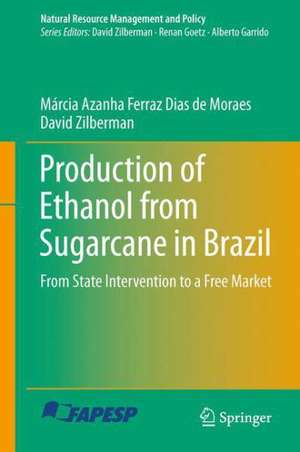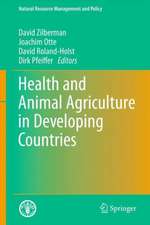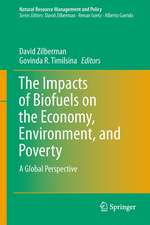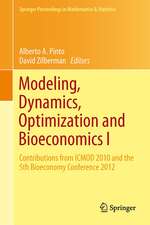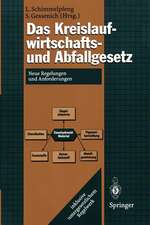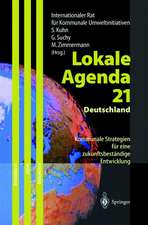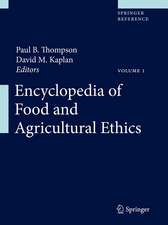Production of Ethanol from Sugarcane in Brazil: From State Intervention to a Free Market: Natural Resource Management and Policy, cartea 43
Autor Márcia Azanha Ferraz Dias de Moraes, David Zilbermanen Limba Engleză Hardback – 11 apr 2014
| Toate formatele și edițiile | Preț | Express |
|---|---|---|
| Paperback (1) | 637.46 lei 6-8 săpt. | |
| Springer International Publishing – 3 sep 2016 | 637.46 lei 6-8 săpt. | |
| Hardback (1) | 642.51 lei 6-8 săpt. | |
| Springer International Publishing – 11 apr 2014 | 642.51 lei 6-8 săpt. |
Din seria Natural Resource Management and Policy
- 18%
 Preț: 1226.24 lei
Preț: 1226.24 lei - 18%
 Preț: 958.56 lei
Preț: 958.56 lei - 18%
 Preț: 958.38 lei
Preț: 958.38 lei - 18%
 Preț: 1223.74 lei
Preț: 1223.74 lei - 18%
 Preț: 948.29 lei
Preț: 948.29 lei - 15%
 Preț: 641.03 lei
Preț: 641.03 lei - 18%
 Preț: 954.93 lei
Preț: 954.93 lei - 15%
 Preț: 646.43 lei
Preț: 646.43 lei - 18%
 Preț: 955.08 lei
Preț: 955.08 lei - 18%
 Preț: 1233.37 lei
Preț: 1233.37 lei - 15%
 Preț: 651.84 lei
Preț: 651.84 lei - 18%
 Preț: 951.47 lei
Preț: 951.47 lei - 18%
 Preț: 1229.73 lei
Preț: 1229.73 lei - 18%
 Preț: 1229.28 lei
Preț: 1229.28 lei - 15%
 Preț: 643.00 lei
Preț: 643.00 lei - 18%
 Preț: 1237.14 lei
Preț: 1237.14 lei - 15%
 Preț: 645.79 lei
Preț: 645.79 lei - 15%
 Preț: 650.86 lei
Preț: 650.86 lei - 15%
 Preț: 653.14 lei
Preț: 653.14 lei - 18%
 Preț: 1233.52 lei
Preț: 1233.52 lei - 18%
 Preț: 1233.20 lei
Preț: 1233.20 lei - 18%
 Preț: 950.96 lei
Preț: 950.96 lei - 18%
 Preț: 1242.21 lei
Preț: 1242.21 lei - 18%
 Preț: 1222.01 lei
Preț: 1222.01 lei - 18%
 Preț: 951.29 lei
Preț: 951.29 lei - 18%
 Preț: 1551.11 lei
Preț: 1551.11 lei
Preț: 642.51 lei
Preț vechi: 755.88 lei
-15% Nou
Puncte Express: 964
Preț estimativ în valută:
122.94€ • 128.36$ • 101.75£
122.94€ • 128.36$ • 101.75£
Carte tipărită la comandă
Livrare economică 04-18 aprilie
Preluare comenzi: 021 569.72.76
Specificații
ISBN-13: 9783319031392
ISBN-10: 3319031392
Pagini: 236
Ilustrații: XIII, 221 p. 36 illus., 35 illus. in color.
Dimensiuni: 155 x 235 x 18 mm
Greutate: 0.48 kg
Ediția:2014
Editura: Springer International Publishing
Colecția Springer
Seria Natural Resource Management and Policy
Locul publicării:Cham, Switzerland
ISBN-10: 3319031392
Pagini: 236
Ilustrații: XIII, 221 p. 36 illus., 35 illus. in color.
Dimensiuni: 155 x 235 x 18 mm
Greutate: 0.48 kg
Ediția:2014
Editura: Springer International Publishing
Colecția Springer
Seria Natural Resource Management and Policy
Locul publicării:Cham, Switzerland
Public țintă
ResearchCuprins
Production of Ethanol from Sugarcane in Brazil.- From StateIntervention to a Free Market.- Introduction.- PART 1.- STATE INTERVENTION INTHE SUGARCANE ETHANOL INDUSTRY IN BRAZIL.- State intervention in the chain ofproduction of ethanol from sugarcane in Brazil: its forms and effects on thedevelopment of the sector between the 1930s and 1980s.- PART II.- THE GOVERNMENT DISTANCES ITSELF IN THE 1990S:THE BREAK AND THE LEARNING CURVE.- The 1990s: deregulation of the sector.- Organizationalchanges within the public sphere.- Organizationalchanges within the private sphere.- Changes related to production and marketingcontrols on sugar: fixed production levels, crop plans, exports, and thedifferential collection of the Industrialized Products Tax93.- The marketing of sugarcane andethanol: changes resulting from deregulation.- Activities of theInter-Ministerial Council on Sugar and Ethanol during the deregulationprocess.- Interested parties come to the defense of the sugarcane ethanolindustry.- The process of deregulating the sugarcane ethanol industry.- Political determinants of thedecision-making processes: the players, their power resources, and theredefinition of their roles in the new institutional environment.- The freemarket: the profound changes and the new agenda.
Textul de pe ultima copertă
The success of Brazil in the large-scale production and use of fuel ethanol has been widely discussed and analyzed by other countries interested in adopting policies designed to encourage the use of biofuels. Within this context, certain questions arise: Could the Brazilian experience be replicated in other countries? What were the conditions that enabled the creation of the Brazilian Proálcool (National Ethanol Program and what lessons can be learned? To examine these issues, it is important to understand the functioning of the key, interconnected markets (those for sugarcane, sugar and ethanol), which, from their inception, were the objects of extensive government intervention until 1999. Two main conditions enabled the creation of Proálcool: robust production of sugarcane and sugar (tightly regulated by the government, which applied the numerous regulations then in place); and the military regime that was in place at the time, whose decision-making and enforcement powers were quite broad, facilitating the carrying out of the necessary actions, as well as making it easier to coordinate the activities of the various stakeholders and sectors involved. This book increases understanding of the functioning of the sugarcane supply chain in Brazil, not only during the phase of government intervention but also in recent years (in the free-market environment). The lessons, positive and negative, gleaned from the Brazilian experience can contribute to reflection on and the development of alternative modalities of biofuel production in other countries, making the book of interest to scholars and policy-makers concerned with biofuel and renewable resources as well as economic development.
Caracteristici
Analyzes the institutional and organizational changes that have affected the sugarcane ethanol industry in Brazil Investigates the process of deregulation of the sugarcane ethanol industry and the end products marketed under a system of government controls Analyzes the period of government intervention in the industry and the subsequent process of deregulation Includes supplementary material: sn.pub/extras
